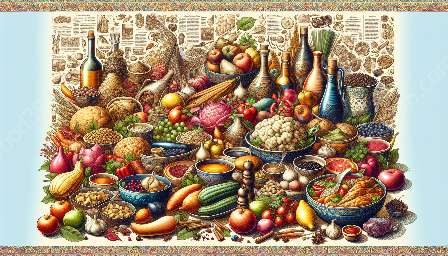Fermented foods have been a staple of human diets since the earliest days of civilization. Exploring the evidence for the earliest forms of fermented foods can provide valuable insights into the history of food culture and its connection to early agricultural practices. This article will delve into the historical context and archaeological evidence for the origins of fermented foods, as well as their significance in the development of food cultures.
Early Agricultural Practices and Fermentation
The origins of fermented foods can be traced back to the early agricultural practices of ancient societies. As humans transitioned from a nomadic lifestyle to settled agricultural communities, they discovered the process of fermentation as a way to preserve food and enhance its nutritional value. Early agricultural societies likely stumbled upon fermentation accidentally, as they stored food in containers made from natural materials such as gourds, clay pots, or animal skins, which provided the ideal conditions for microbial fermentation.
One of the earliest forms of fermented food is believed to be beer, which emerged in ancient Mesopotamia around 7000 BCE. The Sumerians, who inhabited this region, developed the technique of brewing beer using barley and other grains. The discovery of residue from fermented beverages in pottery vessels at archaeological sites in ancient Mesopotamia provides compelling evidence for the early practice of fermentation as part of early agricultural activities.
Development of Food Cultures
The advent of fermented foods played a crucial role in the development of food cultures in ancient societies. Fermentation not only allowed for the preservation of seasonal harvests but also influenced the culinary traditions and social practices of early civilizations. For instance, the consumption of fermented dairy products, such as yogurt and cheese, became integral to the food cultures of societies in regions like the Middle East, the Mediterranean, and Central Asia.
Moreover, the use of fermented foods in religious rituals and social gatherings further solidified their significance in early food cultures. The communal aspect of brewing and sharing fermented beverages, such as mead and wine, fostered social cohesion and symbolic meanings within ancient societies, shaping their food culture and social identities.
Origin and Evolution of Food Culture
The origin and evolution of food culture are intricately linked to the earliest forms of fermented foods in ancient societies. Fermentation not only provided a means of food preservation but also transformed raw ingredients into diverse and palatable culinary offerings, contributing to the richness and diversity of food cultures across different regions of the world.
Furthermore, the transmission of fermentation knowledge and techniques through trade routes and cultural exchanges facilitated the spread of fermented foods and the evolution of food cultures. The Silk Road, for example, served as a conduit for the exchange of fermented foods and beverages between East and West, leading to the assimilation of fermentation practices into the food cultures of diverse civilizations.
In conclusion, the evidence for the earliest forms of fermented foods in ancient societies offers a glimpse into the intersection of early agricultural practices and the development of food cultures. By understanding the historical origins and cultural significance of fermented foods, we gain valuable insights into the intricate tapestry of food culture and its evolution throughout human history.


